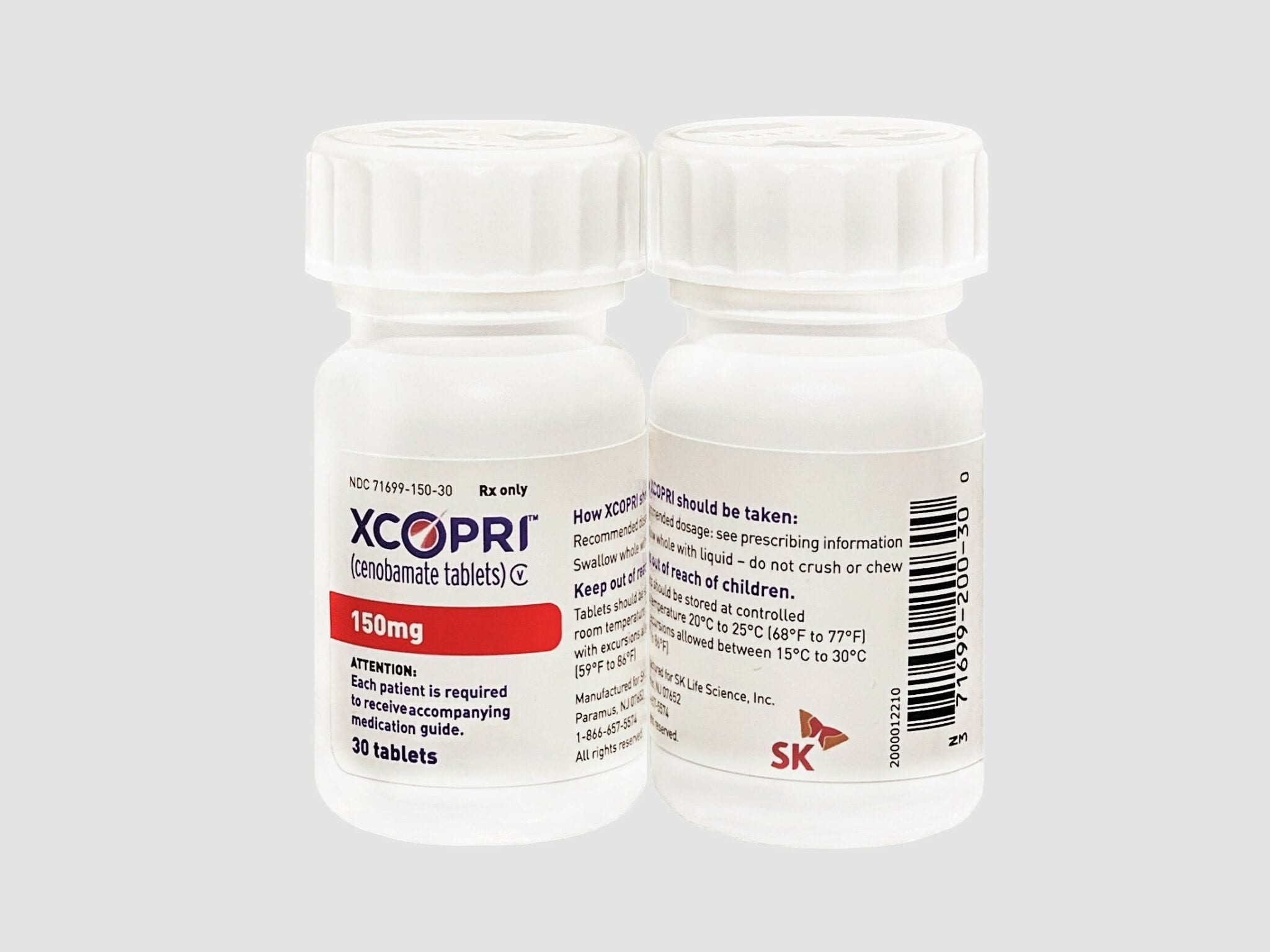
Forging an Innovative Path in CNS Treatment
In 2019, SK Biopharmaceutical Co. Ltd., alongside its U.S. subsidiary SK Life Science, Inc., became the first South Korean company to independently bring a compound from discovery to FDA approval – a moment that was 20 years in the making. On November 21, 2019, the FDA announced its approval of XCOPRI® (cenobamate tablets) CV for the treatment of partial-onset seizures in adults, fortifying the company to emerge as a global pharmaceutical player. Two months later, the world confronted a deadly pandemic.
Everything suddenly became uncertain and tenuous. Though there was buzz and excitement about the new medicine, a major decision had to be made: launch now or wait? Leaders considered patient needs and decided to forge ahead. In May 2020, SK life science adapted to this new reality and launched XCOPRI® with the virtual support, access and resources that patients, caregivers and healthcare providers may need.
“Our team has always been driven to make a difference for those who live with central nervous system disorders no matter what,” said Jeong Woo Cho, PhD, President and CEO of SK Biopharmaceuticals and SK life science. “The progress we have made so far would not have been possible without the company’s long-standing commitment to creating economic and social value through innovation, its appetite for taking appropriate risks, and discipline to operate efficiently.”

All of the news, delivered with full-text to your inbox. For professionals discovering, developing, and marketing biopharmaceutical drugs.
Jeong Woo Cho, PhD, President and CEO of SK Biopharmaceuticals and SK life science
Click on the image to see the full-sized version
This spirit to adapt and take risks is not an anomaly for SK Biopharmaceuticals and SK life science nor their parent company, SK Group. Founded on an ethos of innovation and collaboration, SK Group started as a textile enterprise and reinvented itself following the Korean War by exploring, acquiring and leading new ventures to become the third largest conglomerate in South Korea. After achieving success in other verticals – namely oil and gas – SK Group ventured into fine chemical as its new growth. Then, it assigned a small team of scientists to explore and invest in a new value-added arena: drug discovery and development. SK Group decided to focus its efforts on discovering compounds to treat central nervous system (CNS) disorders, an area where high unmet needs still existed, and began its ambitious journey to understand and treat the mysteries of the human brain.
Approximately three million adults¹ in the U.S. live with active epilepsy and nearly 60 percent have seizures, even while taking an anti-seizure medication (ASM)², demonstrating a great unmet need for those living with the condition.
“Epilepsy can be a challenging condition to manage given it has significant physical and mental effects on patients,” said Dr. Marc Kamin, Chief Medical Officer at SK life science. “That is why delivering new treatment options to the community is such a critical task.”
In addition to delivering treatment, SK life science has strengthened its footprint in the U.S. by working with the epilepsy community to raise awareness, collaborating on new ideas and offering new resources. The pandemic had upended the normal course of in-person healthcare provider visits, medical conferences and patient care, but SK life science moved forward using digital resources at its disposal to help with their needs.
 Last year, SK life science debuted a new virtual experience at the American Epilepsy Society (AES) annual meeting to bring healthcare providers into the lives of patients and showcase the clinical profile of XCOPRI® (cenobamate tablets) CV. Previously, the company also sponsored the “Seize the Truth About Epilepsy Perceptions” (STEP) Survey to understand the current state of epilepsy in the United States and foster better communication between patients and their care team.
Last year, SK life science debuted a new virtual experience at the American Epilepsy Society (AES) annual meeting to bring healthcare providers into the lives of patients and showcase the clinical profile of XCOPRI® (cenobamate tablets) CV. Previously, the company also sponsored the “Seize the Truth About Epilepsy Perceptions” (STEP) Survey to understand the current state of epilepsy in the United States and foster better communication between patients and their care team.
“In the midst of this pandemic, we knew there were patients and healthcare providers who were waiting for this option,” said Sebby Borriello, Vice President and Chief Commercial Officer at SK life science. “We listened to clinicians and adopted digital communication practices to help them through the process of onboarding new patients in a virtual environment. This was a marathon, not a sprint, and we want epilepsy stakeholders to know that they should rely on us for consistent support as we work to fulfill our company vision of becoming a leader within the CNS community.”
Around the world, the company has forged strategic ties to develop and commercialize cenobamate. SK Biopharmaceuticals forged licensing agreements with Arvelle Therapeutics GmbH (recently acquired by Angelini Pharma) in Europe and Ono Pharmaceutical Co., Ltd. in Japan.
“We cannot apply a one-size approach to all markets. We must be flexible and strategic in our commercial operations in order to grow and deliver on our promise,” said Dr. Cho. “Given the U.S. pharmaceutical marketplace and regulatory landscape, we are optimistic about laying a strong foundation for the future, and we look forward to building partnerships globally that will provide an effective, innovative treatment to patients.”
In 2021 and beyond, SK Biopharmaceuticals and SK life science are poised to invest and develop a pipeline of potential new treatments for CNS disorders, as part of efforts to expand its business portfolio for future growth.
“Our mission is simple. We connect health and happiness to offer hope for a better life.” said Dr. Cho. “Our team is driven to make a difference by developing and providing new CNS medicines, and our success is defined by those who are positively impacted by the treatment and support we provide.”
¹Centers for Disease Control and Prevention. Epilepsy. https://www.cdc.gov/epilepsy/ about/fast-facts.htm. Accessed January 21, 2021
²Tian N, Boring M, Kobau R, Zack MM, Croft JB. Active epilepsy and seizure control in adults — United States, 2013 and 2015. MMWR Morb Mortal Wkly Rep 2018; 67(15): 437–442. Accessed January 21, 2021
IMPORTANT SAFETY INFORMATION AND INDICATION FOR XCOPRI® (cenobamate tablets) CV
DO NOT TAKE XCOPRI IF YOU:
- Are allergic to cenobamate or any of the other ingredients in XCOPRI.
- Have a genetic problem (called Familial Short QT syndrome) that affects the electrical system of the heart.
XCOPRI CAN CAUSE SERIOUS SIDE EFFECTS, INCLUDING:
Allergic reactions: XCOPRI can cause serious skin rash or other serious allergic reactions which may affect organs and other parts of your body like the liver or blood cells. You may or may not have a rash with these types of reactions. Call your healthcare provider right away and go to the nearest emergency room if you have any of the following: swelling of your face, eyes, lips, or tongue, trouble swallowing or breathing, a skin rash, hives, fever, swollen glands, or sore throat that does not go away or comes and goes, painful sores in the mouth or around your eyes, yellowing of your skin or eyes, unusual bruising or bleeding, severe fatigue or weakness, severe muscle pain, frequent infections, or infections that do not go away. Take XCOPRI exactly as your healthcare provider tells you to take it. It is very important to increase your dose of XCOPRI slowly, as instructed by your healthcare provider.
QT shortening: XCOPRI may cause problems with the electrical system of the heart (QT shortening). Call your healthcare provider if you have symptoms of QT shortening including fast heartbeat (heart palpitations) that last a long time or fainting.
Suicidal behavior and ideation: Antiepileptic drugs, including XCOPRI, may cause suicidal thoughts or actions in a very small number of people, about 1 in 500. Call your health care provider right away if you have any of the following symptoms, especially if they are new, worse, or worry you: thoughts about suicide or dying; attempting to commit suicide; new or worse depression, anxiety, or irritability; feeling agitated or restless; panic attacks; trouble sleeping (insomnia); acting aggressive; being angry or violent; acting on dangerous impulses; an extreme increase in activity and talking (mania); or other unusual changes in behavior or mood.
Nervous system problems: XCOPRI may cause problems that affect your nervous system. Symptoms of nervous system problems include: dizziness, trouble walking or with coordination, feeling sleepy and tired, trouble concentrating, remembering, and thinking clearly, and vision problems. Do not drive, operate heavy machinery, or do other dangerous activities until you know how XCOPRI affects you.
Do not drink alcohol or take other medicines that can make you sleepy or dizzy while taking XCOPRI without first talking to your healthcare provider.
DISCONTINUATION:
Do not stop taking XCOPRI without first talking to your healthcare provider. Stopping XCOPRI suddenly can cause serious problems. Stopping seizure medicine suddenly in a patient who has epilepsy can cause seizures that will not stop (status epilepticus).
DRUG INTERACTIONS:
XCOPRI may affect the way other medicines work, and other medicines may affect how XCOPRI works. Do not start or stop other medicines without talking to your healthcare provider. Tell healthcare providers about all the medicines you take, including prescription and over-the-counter medicines, vitamins and herbal supplements.
PREGNANCY AND LACTATION:
XCOPRI may cause your birth control medicine to be less effective. Talk to your health care provider about the best birth control method to use.
Talk to your health care provider if you are pregnant or plan to become pregnant. It is not known if XCOPRI will harm your unborn baby. Tell your healthcare provider right away if you become pregnant while taking XCOPRI. You and your healthcare provider will decide if you should take XCOPRI while you are pregnant. If you become pregnant while taking XCOPRI, talk to your healthcare provider about registering with the North American Antiepileptic Drug (NAAED) Pregnancy Registry. The purpose of this registry is to collect information about the safety of antiepileptic medicine during pregnancy. You can enroll in this registry by calling 1-888-233-2334 or go to www.aedpregnancyregistry.org.
Talk to your health care provider if you are breastfeeding or plan to breastfeed. It is not known if XCOPRI passes into breastmilk. Talk to your healthcare provider about the best way to feed your baby while taking XCOPRI.
COMMON SIDE EFFECTS:
The most common side effects in patients taking XCOPRI include dizziness, sleepiness, headache, double vision, and feeling tired.
These are not all the possible side effects of XCOPRI. Tell your healthcare provider if you have any side effect that bothers you or that does not go away. For more information, ask your healthcare provider or pharmacist. Call your doctor for medical advice about side effects. You may report side effects to FDA at 1-800-FDA-1088 or at www.fda.gov/medwatch.
DRUG ABUSE:
XCOPRI is a federally controlled substance (CV) because it can be abused or lead to dependence. Keep XCOPRI in a safe place to prevent misuse and abuse. Selling or giving away XCOPRI may harm others and is against the law.
INDICATION:
XCOPRI is a prescription medicine used to treat partial-onset seizures in adults 18 years of age and older. It is not known if XCOPRI is safe and effective in children under 18 years of age.
Please see additional patient information in the Medication Guide. This information does not take the place of talking with your healthcare provider about your condition or your treatment.
Please see full Prescribing Information.
XCOPRI® is a registered trademark of SK Biopharmaceuticals Co., Ltd.
